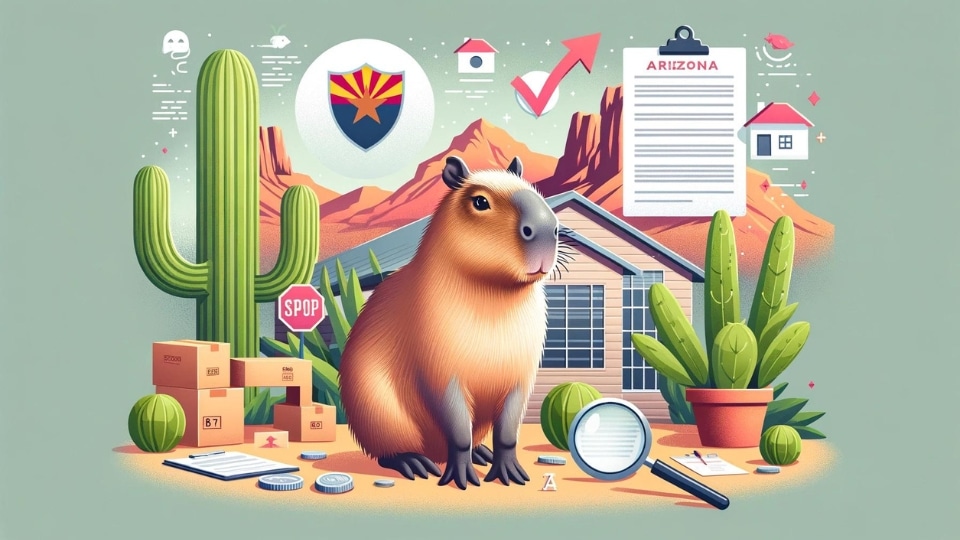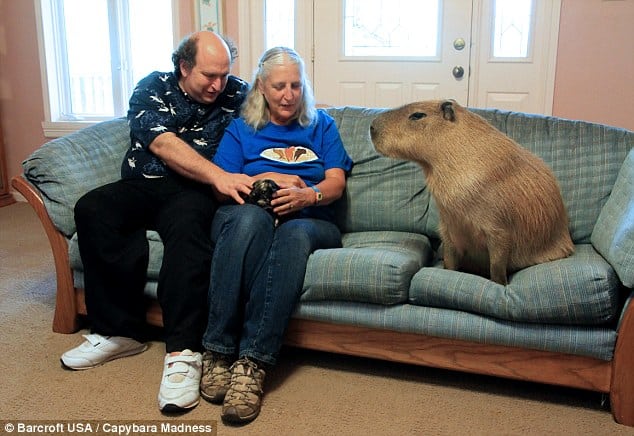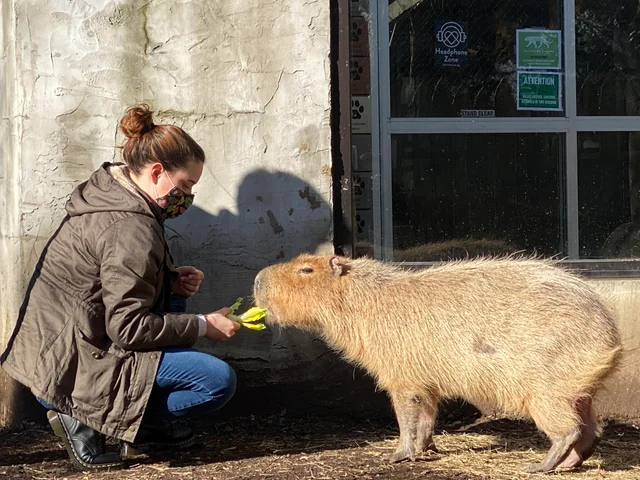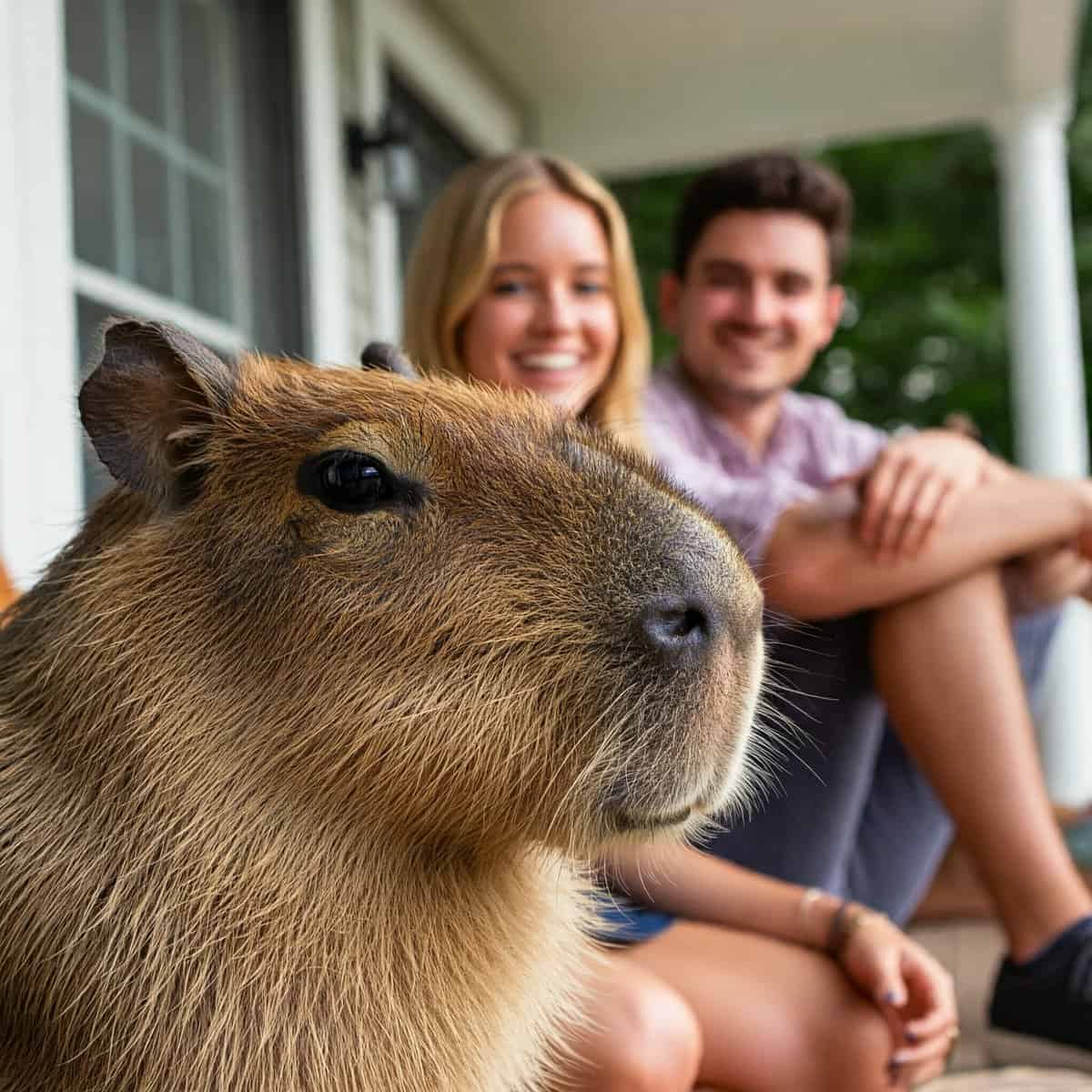The Legality of Capybara Ownership: Exploring the Laws and Regulations in the USA
Capybaras are the largest rodents in the world, native to South America. They are known for their friendly and social nature, making them popular exotic pets in some parts of the world. Capybaras are semi-aquatic animals, often found near bodies of water such as rivers, lakes, and marshes.
They have webbed feet and can swim with ease, making them well-adapted to their natural habitat. Capybaras are herbivores, feeding on a diet of grasses and aquatic plants. They are also known for their unique vocalizations, which include purring, barking, and whistling.
Capybaras are highly social animals and are often found in groups, known as herds, which can consist of up to 100 individuals. They are also known to form strong bonds with their human caretakers, making them a popular choice for those looking for an unusual and affectionate pet.
Capybaras have become increasingly popular as pets in the United States, with many people drawn to their unique appearance and friendly demeanor. However, owning a capybara comes with its own set of legal considerations and requirements.
It is important for prospective capybara owners to be aware of the legal status of these animals in the USA before considering bringing one into their home. Additionally, there are specific requirements that must be met in order to properly care for a capybara, including providing adequate space, diet, and socialization.
In this article, we will explore the legal status of capybaras in the USA, the requirements for owning one, as well as the potential risks and benefits of capybara ownership.
Legal Status of Capybaras in the USA
The legal status of capybaras in the USA varies from state to state. In some states, capybaras are considered exotic pets and are legal to own with the proper permits and licenses.
However, in other states, capybaras are classified as wild animals and are prohibited from being kept as pets. It is important for prospective capybara owners to research the laws and regulations in their specific state before considering bringing one into their home.
Additionally, it is important to obtain the necessary permits and licenses in order to legally own a capybara. Failure to do so can result in fines and legal consequences.
Here is a comprehensive table by Capybaras summarizing the legal status of capybara ownership in the United States:
| State | Legal Status | Notes |
|---|---|---|
| Alabama | Legal | Ownership allowed without a permit. |
| Alaska | Illegal | Capybaras are not on the approved species list for exotic pet ownership. |
| Arizona | Legal with permit | A special license is required for ownership. |
| Arkansas | Legal with permit | A permit must be obtained from state authorities. |
| California | Illegal | Capybara ownership is prohibited in the state. |
| Colorado | Illegal | Capybaras are not on the list of approved exotic pets. |
| Connecticut | Illegal | Wild rodents, including capybaras, are not allowed as pets. |
| Delaware | Legal with permit | Ownership is permitted with a state-issued permit. |
| Florida | Legal with permit | Capybaras require a Class III Wildlife permit for ownership. |
| Georgia | Illegal | Capybaras are classified as wild animals and are not permitted as pets. |
| Hawaii | Illegal | Exotic pets, including capybaras, are strictly prohibited. |
| Idaho | Illegal | The state does not allow ownership of capybaras. |
| Illinois | Legal with permit | Requires a special exotic pet permit. |
| Indiana | Legal | Capybara ownership is allowed without restrictions. |
| Iowa | Legal | Ownership is permitted without any specific permit. |
| Kansas | Legal with permit | Permit required for exotic pet ownership. |
| Kentucky | Legal with restrictions | May require local or county permits. |
| Louisiana | Legal with permit | A permit is necessary for capybara ownership. |
| Maine | Illegal | Capybaras are not approved for ownership in the state. |
| Maryland | Illegal | Ownership of wild animals like capybaras is prohibited. |
| Massachusetts | Illegal | Exotic pets, including capybaras, are not allowed. |
| Michigan | Legal | Ownership is allowed without a permit. |
| Minnesota | Legal | No restrictions on owning capybaras. |
| Mississippi | Legal | Capybara ownership is permitted without a permit. |
| Missouri | Legal with restrictions | Local regulations may apply. |
| Montana | Legal | Ownership allowed without restrictions. |
| Nebraska | Legal with permit | Exotic pet permit required. |
| Nevada | Legal | Capybara ownership is permitted without a permit. |
| New Hampshire | Illegal | Ownership of capybaras is prohibited. |
| New Jersey | Legal with permit | Permit required for exotic pet ownership. |
| New Mexico | Illegal | Ownership of capybaras is not allowed. |
| New York | Legal with permit | Exotic pet license is necessary for capybara ownership. |
| North Carolina | Legal | Ownership allowed, but local restrictions may apply. |
| North Dakota | Legal | Capybara ownership is unrestricted. |
| Ohio | Legal with permit | A permit is required for exotic animal ownership. |
| Oklahoma | Legal | Capybaras can be owned without restrictions. |
| Oregon | Legal with permit | A permit is necessary for exotic pet ownership. |
| Pennsylvania | Legal with permit | A special permit is required for capybaras. |
| Rhode Island | Illegal | Ownership of capybaras is prohibited. |
| South Carolina | Legal | No restrictions on owning capybaras. |
| South Dakota | Legal with permit | Permit required for exotic animals. |
| Tennessee | Legal with restrictions | Ownership is allowed, but permits may be required in some counties. |
| Texas | Legal | Capybara ownership is permitted without restrictions. |
| Utah | Illegal | Capybaras are not approved for ownership. |
| Vermont | Illegal | Wild rodents, including capybaras, are prohibited as pets. |
| Virginia | Legal | Ownership allowed without restrictions. |
| Washington | Legal with permit | Exotic pet permit required. |
| West Virginia | Legal | Capybara ownership is permitted without restrictions. |
| Wisconsin | Legal | No restrictions on owning capybaras. |
| Wyoming | Legal with permit | A permit is necessary for exotic pet ownership. |
In states where capybaras are legal to own, there may still be restrictions on their ownership. For example, some states may require a minimum amount of acreage for capybara enclosures, as well as specific fencing and housing requirements.
It is important for prospective capybara owners to familiarize themselves with these regulations in order to ensure that they are able to provide a suitable environment for their pet.
Additionally, it is important to consider the potential impact of owning a capybara on the local ecosystem, as they are considered an invasive species in some areas. Overall, it is crucial for prospective capybara owners to thoroughly research the legal requirements and considerations before deciding to bring one into their home.
Requirements for Owning a Capybara
Owning a capybara comes with a unique set of requirements that must be met in order to provide a suitable environment for these animals. Capybaras are highly social animals and require ample space to roam and interact with others.
They also require access to water for swimming and cooling off, as well as a diet consisting of grasses and aquatic plants. Additionally, capybaras require regular veterinary care to ensure their health and well-being. It is important for prospective capybara owners to be prepared to meet these requirements before deciding to bring one into their home.
One of the most important considerations when it comes to owning a capybara is providing adequate space for them to roam and socialize. Capybaras are highly social animals and thrive in groups, so it is recommended to have at least two capybaras if possible.
Additionally, they require access to water for swimming and cooling off, so a large pond or pool is essential for their well-being. Capybaras also require a diet consisting of grasses and aquatic plants, which can be supplemented with hay and commercial rodent pellets.
It is important for prospective capybara owners to be prepared to provide these dietary needs in order to ensure the health and well-being of their pet.
In addition to space and dietary requirements, capybaras also require regular veterinary care to ensure their health and well-being. It is important for prospective capybara owners to find a veterinarian who is experienced in treating exotic animals, as capybaras have unique medical needs that may differ from more common pets.
Regular check-ups and vaccinations are essential for maintaining the health of a capybara, so it is important for prospective owners to be prepared for these ongoing expenses. Overall, owning a capybara requires a significant commitment in terms of space, diet, and veterinary care, so it is important for prospective owners to carefully consider these requirements before deciding to bring one into their home.
Potential Risks and Challenges of Capybara Ownership
While owning a capybara can be a rewarding experience, it also comes with its own set of potential risks and challenges. One of the main challenges of owning a capybara is providing adequate space for them to roam and socialize.
Capybaras are highly social animals and thrive in groups, so it is recommended to have at least two capybaras if possible.
Additionally, they require access to water for swimming and cooling off, so a large pond or pool is essential for their well-being. Providing this level of space and socialization can be challenging for some prospective owners, especially those who live in urban or suburban areas with limited outdoor space.
Another potential challenge of owning a capybara is their dietary needs. Capybaras require a diet consisting of grasses and aquatic plants, which can be supplemented with hay and commercial rodent pellets.
Providing this level of dietary variety can be challenging for some prospective owners, especially those who may not have access to fresh grasses or aquatic plants year-round. Additionally, capybaras have unique medical needs that may differ from more common pets, so finding a veterinarian who is experienced in treating exotic animals can be a challenge in some areas.
Overall, owning a capybara requires a significant commitment in terms of space, diet, and veterinary care, so it is important for prospective owners to carefully consider these potential risks and challenges before deciding to bring one into their home.
Benefits of Owning a Capybara
Despite the potential risks and challenges of owning a capybara, there are also many benefits to having one as a pet. Capybaras are known for their friendly and social nature, making them excellent companions for those looking for an unusual and affectionate pet.
They are also highly intelligent animals and can form strong bonds with their human caretakers. Many capybara owners report that their pets are affectionate and enjoy being petted and cuddled.
Capybaras are also relatively low-maintenance pets compared to other exotic animals. They do not require grooming or bathing like some other exotic pets do, and they are generally clean animals that groom themselves regularly. Additionally, they are herbivores and have relatively simple dietary needs compared to carnivorous or omnivorous pets.
Another benefit of owning a capybara is their unique appearance and behavior. Capybaras are often described as looking like giant guinea pigs or oversized hamsters, making them an interesting conversation piece for visitors.
They are also known for their vocalizations, which include purring, barking, and whistling. Many capybara owners find these vocalizations endearing and enjoy listening to them as part of their daily routine.
Overall, owning a capybara can be a rewarding experience for those who are prepared to meet their unique needs and challenges. They make excellent companions for those looking for an unusual and affectionate pet, and their low-maintenance nature makes them an attractive option for many prospective owners.
Alternatives to Owning a Capybara
For those who are interested in owning an exotic pet but may not be prepared to meet the unique needs of a capybara, there are several alternative options to consider.
One popular alternative is the guinea pig, which is a small rodent that is known for being friendly and social. Guinea pigs are relatively low-maintenance pets compared to other exotic animals and can make excellent companions for those looking for an unusual pet.

Another alternative to owning a capybara is the chinchilla, which is a small rodent native to the Andes mountains in South America. Chinchillas are known for their soft fur and playful nature, making them popular pets for those looking for an exotic companion.
Like guinea pigs, chinchillas are relatively low-maintenance pets compared to other exotic animals and can make excellent companions for those looking for an unusual pet.
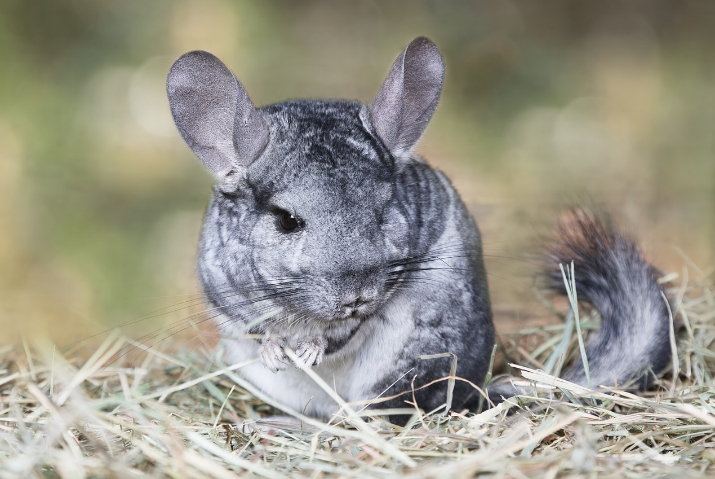
For those who may be interested in a larger exotic pet but may not be prepared to meet the unique needs of a capybara, there are several alternative options to consider as well. One popular alternative is the sugar glider, which is a small marsupial native to Australia and New Guinea.
Sugar gliders are known for their playful nature and ability to form strong bonds with their human caretakers. They are relatively low-maintenance pets compared to other exotic animals and can make excellent companions for those looking for an unusual pet.

Overall, there are several alternative options available for those who may be interested in owning an exotic pet but may not be prepared to meet the unique needs of a capybara. It is important for prospective owners to carefully research these alternatives in order to find the best fit for their lifestyle and preferences.
Considerations for Prospective Capybara Owners
Owning a capybara can be a rewarding experience for those who are prepared to meet their unique needs and challenges.
They make excellent companions for those looking for an unusual and affectionate pet, and their low-maintenance nature makes them an attractive option for many prospective owners. However, it is important for prospective capybara owners to carefully consider the legal status of these animals in their specific state before deciding to bring one into their home.

Additionally, it is important for prospective owners to be prepared to meet the specific requirements of owning a capybara, including providing adequate space, diet, and veterinary care. Failure to meet these requirements can result in negative consequences for both the owner and the animal.
For those who may not be prepared to meet the unique needs of a capybara but are still interested in owning an exotic pet, there are several alternative options available that may be better suited to their lifestyle and preferences.
Overall, owning a capybara requires careful consideration and preparation in order to provide a suitable environment for these unique animals. It is important for prospective owners to thoroughly research the legal requirements and considerations before deciding to bring one into their home in order to ensure the health and well-being of both the animal and themselves.

